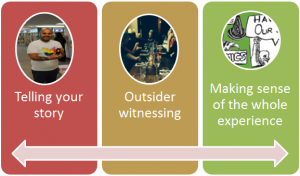A little sugar can make all the difference; the doctors might not agree. When I was lost and could not make a sense of whom or where I was going, a dear friend, June, asked me to put myself forward to attend a meeting that was set up to advise on research.
I was sitting there thinking, “What would they need someone like me for? I have no clue about research. What can I offer? I have no skills, nor do I have anything interesting to offer. What do I know about mental ill health research?”
How wrong could I have been? Over the years I have been involved in SUGAR I have seen the hardness that has come from the stigma of accessing mental health services. To lose your own mind and to have all rights taken away from you because your own mind does not seem to be working in the same ways as it once did is the most painful thing to have to deal with.
Not making people feel worried about why you are talking so fast, why you have emailed everyone with strange emails, the overspending and reduced inhabitations are symptoms for this illness that changes you from the person that people want to be around to the person who is not quite right. I lost my lovers, peers and job when I became unwell, along with my self-esteem.
I got it back by coming to SUGAR.
Why, if I was a doctor I would be writing prescriptions for SUGAR, is because the action of coming together with people that have been through situations that I have been through, knowing that part of the research has been driven by the action of storytelling and the narrative of your mental ill health journey, has been really helpful in my recovery. I have been noticing that telling your own story actively, and being listened to by your peers, as well as people that can make a difference to others by using the richness of your story to ensure that others are able to access services that meet their needs can be a powerful facilitator of personal recovery. I call this the SUGAR model.
The SUGAR model
Step one: Collaboratively working as peers with a wide range of people, placing you as the expert.
Step two: Stories telling the narrative of your mental health journey to support change.
Step three: The validation of your lived experience by others and peers. This includes key stakeholders such as carers and mental health professionals, who may have historically had some discourse when it comes to being considered your peers.
Step four: Making a difference, knowing that you are the only one who can provide this narrative to enrich the research and/or recovery work.
Telling your story
Isaac Samuels 2014 c
Keep posted for more on my SUGAR blog and more on my model that supports recovery.


October 13, 2014 at 4:47 pm
What a wicked bog Isaac, Keep up all the good work. I feel so much better knowing that people like you are talking about mental health
February 16, 2015 at 2:55 pm
Great Blog Isaac. Really helpful for all people suffering with the stigma of having mental illness.
I look forward to meeting you in person soon!
David.